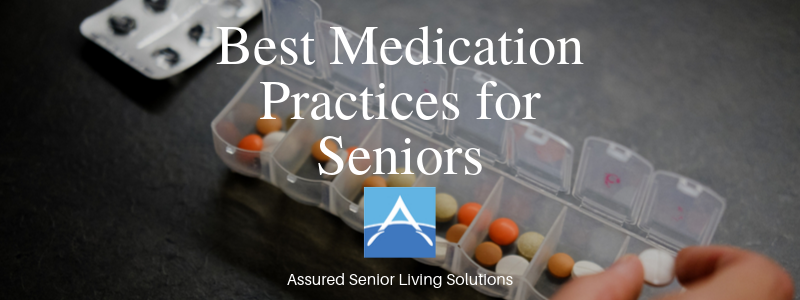When you’re caring for someone who takes prescriptions, it’s important to establish good habits and medication practices. As you observe changing behaviors in your loved one, it’s easy to overlook something as simple as medication.
Consider the following suggestions for routine medication practices.
Establish a trusted doctor relationship
Regular visits to the doctor help ensure that the proper medication is being used, the correct dosages are being given and that there are no contradictions with the various prescriptions (such as two medications that counteract one another).
If you have questions or concerns about the medications that are prescribed, ask the doctor for clarification. Be sure to also understand functions, and side-effects of all prescriptions.
Storage and handling
Make sure all medication is locked away, out of reach of small children and other vulnerable people and pets. Always keep the labels on the pill bottles and double check to make sure the label matches the drug and dose that was prescribed.
It’s also important to review storage instructions as each medication could have different requirements. Be sure to read and follow instructions for refrigeration, light, moisture, etc. If medications aren’t stored properly, their effectiveness may be jeopardized.
If you’re loved one is independent, you may determine they are capable of handling their own medications. With dementia, however, they may confuse medications, or the instructions for taking them. It’s a good idea to manage the medications for your loved one and to regulate their administration.
While pill boxes may be an effective practice for some, people with dementia may confuse what day it is and fail to take their medications, or wind up taking them twice. If you are going to use weekly pill boxes, make sure you are helping to ensure proper doses are taken on appropriate days.
Follow instructions
It’s important to always take medications as prescribed. If you don’t, you could risk their being ineffective. Or worse, improper administration could be harmful. Serve a small snack if food is recommended. Use calendars, alarms or other devises as reminders. If you own a smart phone or tablet, for instance, set an alarm to alert your loved one when it’s time to take their medication.
When reviewing instructions, it’s a good idea to also check expiration dates. If medications are outdated, or no longer in use, talk to the prescriber for proper disposal.
Disposal
Old practices, may no longer be best practices. Medication should not be trashed or flushed down the toilet, but rather taken to drop-off sites. Talk to your doctor about disposal sites near you.
Up-to-date lists
Always carry a list of the medications your loved one takes. In case of an emergency it’s important that first responders have this information in addition to any allergies. This will also prove to be helpful at your doctor visits. Ensure the list is always up to date and present when you are away from home. But also keep a master list at the house for anyone who helps to provide care in your absence.
Clarity is key when it comes to medication practices. Whenever there is uncertainty, don’t hesitate to question prescribers, pharmacists and other professionals so you are equipped to provide the best care.
Contributed by Leah Bigham
Contact us if you have questions about your loved one's medication management and we can refer you to sources of help or advice.


